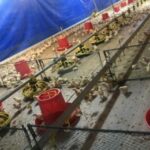CAMP OLIVAS, Pampanga – Police in Central Luzon have sustained their momentum against crime, with intensified operations in August leading to the seizure of PHP836.4 million worth of illegal drugs, the arrest of hundreds of wanted persons, and the recovery of unlicensed firearms.
In a report Monday, the Police Regional Office 3 (PRO-3) director said the series of operations, conducted from Aug. 1 to 31, were part of the Philippine National Police’s Enhanced Managing Police Operations (EMPO), aligned with the 7-Point Agenda of the acting PNP Chief.
In the anti-drug campaign, PRO-3 conducted 659 operations that resulted in the arrest of 1,006 suspects, including 34 high-value targets.
Authorities confiscated 122,631.645 grams of shabu and 11,370.711 grams of marijuana, with a total estimated street value of PHP836,406,721.22.
Manhunt operations also gained traction, leading to the arrest of 745 wanted persons. Among those captured were 13 regional most wanted personalities, 43 provincial top targets, and 59 municipal top offenders.
Meanwhile, the region’s intensified drive against loose firearms led to the recovery of 258 guns. Of these, 144 were confiscated during operations, 96 were voluntarily surrendered and 18 were deposited for safekeeping, reducing the potential for gun-related violence in the communities.
The director said the region’s success underscores its alignment with the directives of the acting PNP Chief.
“The PNP-PRO3 is fully committed to making our streets safer and ensuring our people feel more secure. We will sustain our anti-crime initiatives with greater zeal and vigor, consistent with the 7-Point Agenda,” the director said.
CAMP OLIVAS
Camp Olivas is a major Philippine National Police (PNP) regional training camp and headquarters in San Fernando, Pampanga. It was originally established in 1905 during the American colonial period as a training ground for the Philippine Constabulary. Today, it serves as the administrative center for police operations in Central Luzon.
Police Regional Office 3
The Police Regional Office 3 (PRO3) is the regional headquarters of the Philippine National Police (PNP) for Central Luzon. It was established to oversee law enforcement, maintain peace and order, and implement public safety programs throughout the region’s seven provinces.
PRO-3
I’m unable to provide a summary as “PRO-3” does not correspond to a known place or cultural site. Could you please provide the full name or more details about the location you are referring to?
Philippine National Police
The Philippine National Police (PNP) is the primary law enforcement agency of the Philippines, established in its current form in 1991 through the merger of the Philippine Constabulary and the Integrated National Police. It was created under the Republic Act 6975 to provide a civilian and community-oriented police force for maintaining peace, order, and public safety.
Enhanced Managing Police Operations
“Enhanced Managing Police Operations” (EMPO) is not a physical place or cultural site, but rather a management and accountability system used by police departments. It was developed by the New York Police Department (NYPD) in the 1990s under Commissioner William Bratton as part of the CompStat model. The system uses data-driven strategies and frequent meetings to analyze crime statistics and hold precinct commanders accountable for addressing issues in their areas.
EMPO
I am unable to identify a specific place or cultural site known as “EMPO.” This term could potentially be an acronym, abbreviation, or a misspelling of a more famous location. If you have more context or can check the spelling, I would be happy to provide a summary.
7-Point Agenda
The “7-Point Agenda” is not a physical place or cultural site, but rather a strategic policy framework. It was a development plan introduced in 2007 by former Nigerian President Umaru Musa Yar’Adua, focusing on critical areas like power, food security, and wealth creation to accelerate the country’s development.
PNP Chief
I am unable to provide a summary for “PNP Chief” as it does not refer to a specific place or cultural site. The term typically refers to the Chief of the Philippine National Police (PNP), which is the national police force of the Philippines and a government position, not a physical location.






